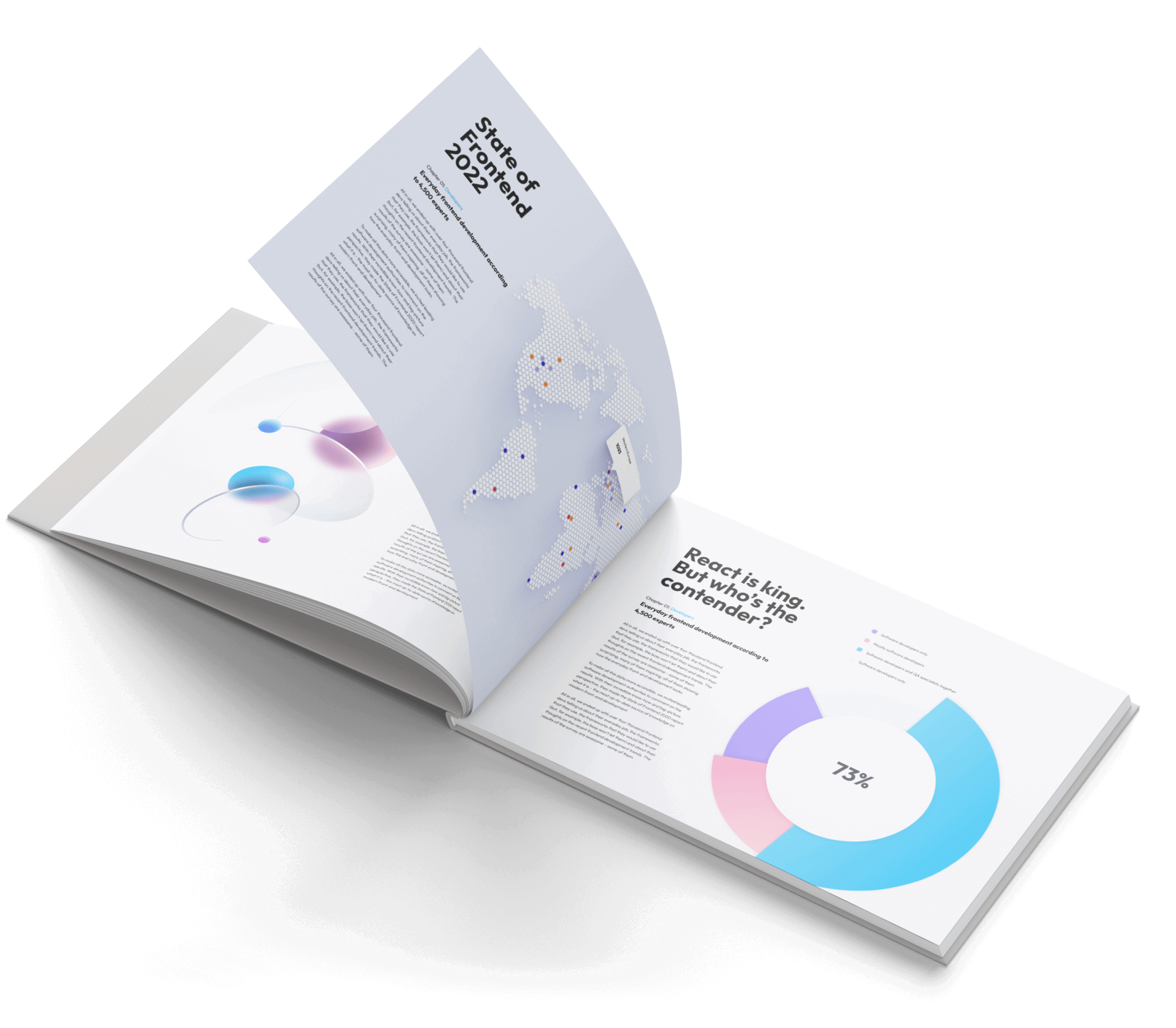Could WordPress themes of the future look entirely different than what we see today? How might React, Vue, or Angular change the way we visualize and interact with websites? What are the implications for developers, designers, and users of WordPress themes?
The modern digital landscape is rapidly evolving, often outpacing the current WordPress themes’ capabilities. According to a W3Techs survey, WordPress powers 639% of all websites, yet many of these sites struggle to provide dynamic interactivity and store data seamlessly due to the limitations of traditional PHP-based themes. A similar study by WP Engine, a leading WordPress digital experience platform, suggests that a vast number of users expect better performance, speed, and interactivity from WordPress sites. Rethinking WordPress theming to incorporate modern JavaScript frameworks like React, Vue, or Angular could resolve these issues, enabling more vibrant, interactive and response-driven interfaces.
In this article, you will learn about the future possibilities of WordPress theming that embrace these modern scripting languages. We will delve into a comparison of the three prominent frameworks – React, Vue, and Angular – illustrating how integrating them with WordPress themes might revolutionize website visualization and interaction. Furthermore, we will discuss the potential challenges that might arise and how developers and designers can navigate through these.
The around-the-corner future of WordPress theming via React, Vue, or Angular could be a game-changer for digital experiences. The next phase of WordPress theming is exciting to envision as we look into how these platforms could shape the future of user interaction, website visualization, and overall performance.

Definitions and Perspectives on the Future of WordPress Theming
WordPress is a free and open-source content management system that helps websites to be easily built and managed. A theme in WordPress dictates the layout or design of a website, giving it its unique look and feel.
As for React, Vue, and Angular, these are advanced JavaScript frameworks used for building user interfaces or UIs. Simply, they are tools to help developers build interactive parts of a website.
The Future of WordPress Theming is expected to have more integration with these JavaScript frameworks, further simplifying web development and offering more flexibility and functionality.
WordPress Theming Powered by React: A New Horizon in Web Development
Adoption of React in WordPress Theming
ReactJS, a JavaScript library developed by Facebook, has been gaining popularity in the WordPress community over the years. The synergy between React and WordPress is due to the introduction and support of RESTful API’s in WordPress. This transition allows developers to separate the front-end and back-end of their websites, creating a decoupled or headless WordPress site with ReactJS.
There are several benefits with React that WordPress developers can leverage. Firstly, React has the benefit of diverse and vast library resources along with the support from a large community. This can drastically reduce the time and effort taken to build complex UI elements. Secondly, React’s component-based architecture improves code readability and manageability especially for larger-scale projects. It allows for code reuse and makes it easier to understand the relation of one component to another.
The Influence of React on WordPress Theming’s Future
WordPress’s decision to incorporate React into their own Gutenberg editor marked a significant nod to the rise of React in WordPress theming. The Gutenberg editor, built primarily using React, presents intuitive UI design and offers a seamless editing experience to the users.
React has already started to reshape the landscape of WordPress theming, pushing traditional PHP-based themes towards a more modern, JavaScript-centric design structure. This means that the future of WordPress theming will commonly include:
- Creating more interactive and dynamic WordPress sites
- Building complex applications that function smoothly within a WordPress environment
- Offering better user interfaces and user experiences that are adaptable and scalable
In the long run, the integration of React within WordPress theming is likely to revolutionize the way we build and interact with websites, making them more responsive, faster, and user-friendly. While the migration to a new technology might be challenging, the lasting advantages such as improved performance, better UI/UX, and scalability promise a positive impact on the WordPress ecosystem entirely.
The shift from PHP to JavaScript, from traditional themes to headless WordPress setups could be daunting. However, the community’s extensive resources and tutorials make the transition much more manageable. As a result, more new themes are likely to be developed using React, which will certainly shape the future of WordPress theming.
Vue and WordPress Theming: Revolutionizing User Interactions and Experiences
Is the Traditional Paradigm of WordPress Theming on the Verge of Breakout?
A paradigm shift in the sphere of WordPress theming appears imminent, ushering in an era of ineffable possibilities. This evolution can be attributed to the integration of Vue.js, a progressive JavaScript framework renowned for its adaptability. This revolutionary tool is blurring the established boundaries of WordPress themes, inducing a disruption that might prove beneficial for both developers and end users. The advent of Vue.js within the WordPress environment introduces an advanced, reactive data model that promotes a more dynamic, app-like user experience. Ultimately, it appears to have the potential to supersede conventional PHP theming, thus, forging a new frontier in WordPress design.
The Impending Issues Surmounted by the Transition
The underlying issue under consideration revolves around the inherent limitations of traditional WordPress theming. The existing PHP paradigm, while reliable, falls short when it comes to rendering dynamic interfaces, instant feedback and data manipulation without reloading the page. This deficiency consequently affects the user experience, making it seem outdated in an era dominated by web apps. The introduction of Vue.js into WordPress mitigates this problem, thereby enabling the development of a more robust, dynamic and intuitive user interface. Nonetheless, this upheaval is not exempt from challenges, the greatest of which might include the requisite of elevated programming skills, the risk of code conflicts and escalated complexity in theme development, especially for those habituated to the simplicity of PHP.
Impressive Implementations Drawing on Vue.js Capabilities
There are several commendable examples that highlight the efficient exploitation of Vue.js capabilities to enhance WordPress theming. Qards, a page-building tool developed by Designmodo, employs Vue.js to create a more reactive, drag-and-drop interface. Another eminent example is that of the eCommerce platform ‘Snipcart’, which utilizes WordPress as a backend and Vue.js to handle the frontend development. The list of examples isn’t confined within the boundaries of WordPress plugins; several themes such as ‘Vue Theme’ and ‘Vue WordPress Theme Starter’ are also taking advantage of Vue.js integration to stand apart. These examples offer a testament to the transformative potential of Vue.js within WordPress, promising a future infused with greater dynamism, reactivity and interactivity.
Angular’s Impact on WordPress Theming: Game-Changer or Overhyped?
Is Traditional WordPress Theming Going Out of Style?
With new waves of innovation flooding the web development landscape, one can’t help but ponder – is traditional WordPress theming facing a challenge of relevance? React, Angular, and Vue, the three titans of Javascript frameworks, have brought forth a route to streamlining modern web development practices. These frameworks provide a common thread – the ability to build single-page applications (SPAs), which differs from traditional WordPress which builds multi-page applications. SPAs provide a more fluid and faster user experience, as all necessary code is loaded initially, and no additional loading is required when surfing the page. But the real turning point lies in the reduced server load, as SPAs only send and receive JSON data, drastically minimizing server resource consumption.
The Conundrum of Legacy Theming
Within this revolutionary backdrop, a predicament emerges – WordPress, being a PHP-centric platform, may find it challenging to integrate with JavaScript-based frameworks like Vue and Angular. The core issue lies in the elementary divergences between PHP and JavaScript. While traditional WordPress theming works brilliantly under PHP, it becomes slightly jumbled when encountering the JavaScript world. Combining both leads to complications, and mismatched integrations often result in clunky, unresponsive, and slow-loading websites.
Embracing Angular For Superior WordPress Themes
Despite the evident challenges, there are certain practices that can seamlessly merge the PHP-rooted WordPress with the JavaScript-dominant Angular. Using the WordPress REST API as a bridge is one such practice. The REST API allows developers to interact with a WordPress installation through HTTP requests, tying the diverse elements of PHP and JavaScript with finesse. Angular can hence interact with WordPress using a more common language, JSON, completely transforming the way themes are created. Using Angular’s components in WordPress themes enables efficient code reusability, making it easier to maintain and update. This aspect becomes particularly potent when dealing with large-scale WordPress sites, where updating individual parts can become a daunting task. The key lies in persistence and a mindful adoption of the new era JavaScript frameworks, which can lead to the creation of WordPress themes that are not only appealing but also demonstrate high-performance capacity.
Conclusion
How will the introduction of React, Vue, and Angular reshape the landscape of WordPress theming? This is indeed a question that deserves pondering. Our investigation has clearly demonstrated their potential to revolutionize how we develop and design WordPress themes. No longer confined to PHP, we can now create more interactive, performant, and user-friendly experiences. React, with its virtual DOM and reusable components, facilitates faster updates and reduces rendering times. Vue’s simplicity, lightness, and exceptional performance make it a strong competitor. Angular, although more complex, offers robust solutions for large-scale applications. While these JavaScript frameworks seem poised to transform WordPress theming, the shift will not happen overnight. Their integration into the WordPress ecosystem requires new approaches, ones that will take time to develop and mature.
We realistically anticipate enhancements in the WordPress theming space and compelling innovations in the pipeline. Following our blog will keep you updated with the latest developments, industry insights, and updates on this evolving landscape. As we stay connected, you will learn more about these frameworks, their applications, additional examples, and the growth path they chart in the world of WordPress theming. Whet your knowledge, deepen your understanding, and stay ahead of the WordPress theming curve by constantly refreshing your feed and sharing our blogs.
We genuinely appreciate your readership and keen interest in our articles. We would like to reassure you that exciting fresh content on ‘React, Vue, and Angular in WordPress Theming’ is on its way. WordPress is at the cusp of venture into this new territory and we hope to traverse this journey together. Through our writing, we aspire to make these technical complexities easier to understand, reveal emerging trends, and open the windows to the exciting possibilities that lie ahead. So, hold on to the anticipation, stay tuned, and join us as we delve deeper. The future promises a truly evocative story of technological evolution and creativity.
F.A.Q.
In the future of WordPress theming, React, Vue, and Angular will play a very significant role as they are modern JavaScript libraries and frameworks that make building user interfaces more efficient. As WordPress evolves, these tools can offer more dynamic and responsive themes, improving overall user experience.
While it’s not necessary, knowledge of React, Vue, or Angular can extremely be beneficial if you’re developing WordPress themes. As these JavaScript frameworks are becoming popular in the community, they can offer advanced and modern features in theme development.
React, Vue, and Angular have the ability to create more interactive, smooth, and dynamic user interfaces for WordPress. They allow WordPress developers to build faster, smoother, and more interactive themes, enhancing the user experience.
The incorporation of React, Vue, and Angular could potentially extend the longevity of WordPress. By adapting these modern JavaScript frameworks, WordPress can remain a current, robust, and competitive option for web development.
Yes, existing WordPress themes can be improved by React, Vue, and Angular. These JavaScript frameworks allow developers to refine and optimize themes, making them perform better, load faster, and provide more interactive and engaging user interfaces.
